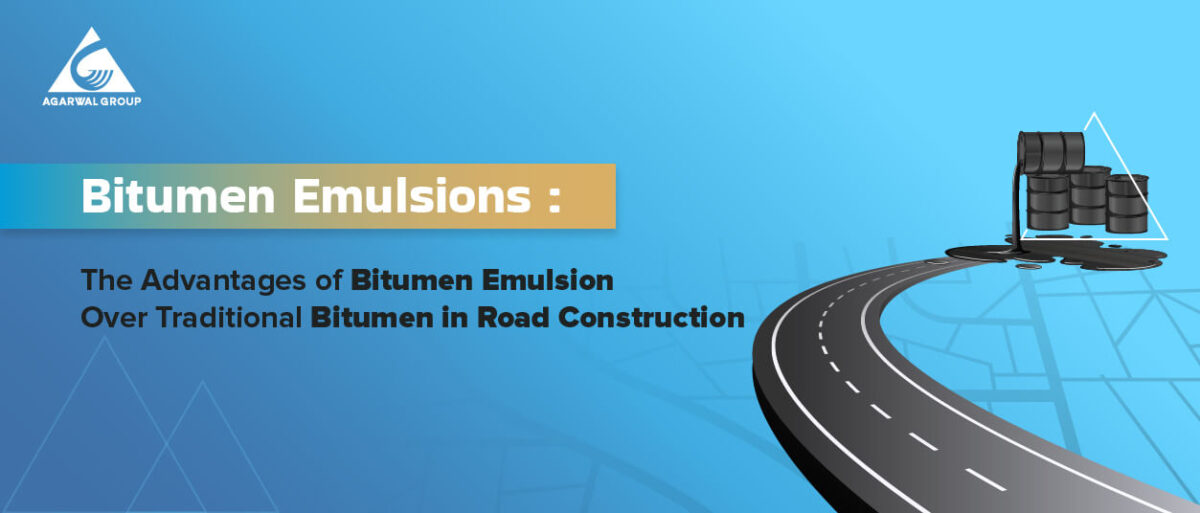When it comes to road construction, bitumen is a popular and essential material used for paving roads and highways. Traditionally, bitumen has been used in its pure form, but in recent years, bitumen emulsions have emerged as a more versatile and efficient alternative.
What are Bitumen Emulsions?
Bitumen emulsion is a widely used mixture of bitumen and water that is stabilised with an emulsifying agent. It has emerged as a versatile and efficient alternative to traditional bitumen in road construction, offering several advantages such as improved workability, reduced environmental impact, and enhanced performance in a wide range of weather conditions.
Bitumen emulsions gained popularity in Europe during the 1920s and 1930s, and the first bitumen emulsion plant was established in the United States in 1926. However, it was not until the 1950s that the use of bitumen emulsion became more widespread, particularly in North America. Today, bitumen emulsion is used in road construction throughout the world and has become a key component of modern road-building techniques.
Over the years, advancements in technology and chemistry have improved the quality of bitumen emulsions and expanded their applications. Today, bitumen emulsions are used not only in road construction but also in a wide range of other industries, including roofing, waterproofing, and mining.
Types of Bitumen Emulsion
Bitumen emulsions can be classified based on different factors such as setting time and surface charge. Here’s an overview of the different types of bitumen emulsions:
Based on Setting Time
Bitumen emulsions are categorised based on their setting time, which refers to the amount of time it takes for the emulsion to break and for the asphalt to set. This is an important factor in determining the appropriate emulsion to use in a particular application. Here’s a closer look at each of the three categories of bitumen emulsions based on their setting time:
- Rapid-Setting Bitumen Emulsions: As the name suggests, rapid-setting bitumen emulsions have a fast setting time, typically in the range of a few minutes to an hour. These emulsions are ideal for surface treatments and patching, as they can quickly and efficiently seal cracks and potholes. Rapid-setting emulsions are commonly used in urban areas where traffic volume is high, and quick repairs are needed to maintain road safety.
- Medium-Setting Bitumen Emulsions: Medium-setting bitumen emulsions have a longer setting time than rapid-setting emulsions, typically in the range of one to three hours. These emulsions are used for fog seals and base stabilisation. Fog seals are a type of surface treatment that is used to seal and protect an existing pavement surface, while base stabilisation is used to improve the strength and durability of the base layer of the pavement. Medium-setting emulsions are also used for tack coats, which are used to bond an existing pavement surface to a new layer of asphalt.
- Slow-Setting Bitumen Emulsions: Slow-setting bitumen emulsions have the longest setting time of the three categories, typically in the range of four to six hours. These emulsions are used for slurry seals, micro-surfacing, and chip seals. Slurry seals are used to seal and protect existing pavements, while micro-surfacing is a type of surface treatment used to improve the texture and skid resistance of the pavement surface. Chip seals are used to seal and protect the pavement surface and are commonly used on rural roads and highways.
Based on Surface Charge
Bitumen emulsions can also be classified based on their surface charge, which plays an important role in determining the appropriate emulsion for a specific application. Here’s a closer look at the three categories of bitumen emulsions based on their surface charge:
- Anionic Bitumen Emulsions: Anionic emulsions have a negatively charged surface and are commonly used in pavement construction. These emulsions are known for their ability to bond well with acidic aggregates, making them ideal for use in areas where the soil and aggregates have high natural acidity. Anionic emulsions are also used for surface treatments and can be applied to existing pavements to protect them from further damage.
- Cationic Bitumen Emulsions: Cationic emulsions have a positively charged surface and are commonly used in applications such as soil stabilization, dust control, and the production of asphalt emulsion mixes. These emulsions are known for their ability to bond well with alkaline aggregates and can be used in areas where the soil and aggregates have high natural alkalinity. Cationic emulsions are also used for tack coats, which are used to bond an existing pavement surface to a new layer of asphalt.
- Non-Ionic Bitumen Emulsions: Non-ionic emulsions have no charge and are mainly used for industrial applications such as adhesives and coatings. These emulsions do not bond well with aggregates and are not suitable for use in pavement construction or surface treatments.
What are the advantages of bitumen road emulsions?
The importance of bitumen emulsion in road construction lies in its ability to improve the efficiency and sustainability of the construction process. Here are a few reasons why bitumen emulsion is an important material for road construction:
- Improved workability: Bitumen emulsion is easier to handle and apply than traditional bitumen, making it more efficient to use. It can be applied at lower temperatures and has a lower viscosity, which reduces the risk of delays in the construction process.
- Reduced environmental impact: Bitumen emulsion is water-based and emits fewer harmful fumes and gases during the application, making it a more sustainable choice for road construction. Its production also requires less energy, which further reduces its environmental impact.
- Enhanced performance: Bitumen emulsion is more resistant to water damage and can be applied more easily in colder temperatures, making it a more versatile and reliable material for road construction.
- Safer for workers: Bitumen emulsion does not require heating or other high-temperature processes during the application, which reduces the risk of accidents and injuries for workers.
- Lower overall cost: Bitumen emulsion is more cost-effective to produce, transport, and apply than traditional bitumen, which can help reduce the overall cost of road construction projects.
Overall, the importance of bitumen emulsion in road construction is that it offers a more efficient, sustainable, and safe alternative to traditional bitumen, while also delivering better performance and a lower overall cost.
Takeaway
Bitumen emulsions have been extensively used by road developers in both India and various parts of the world. They make the mixing and construction of roads smoother, faster, simpler and less expensive as compared to bituminous mixtures.
To sum up we conclude that Bitumen Emulsions are a viable material for road building which solves all the problems facing traditional bitumen and can meet the demand of consumers in a better way.

